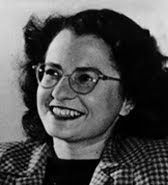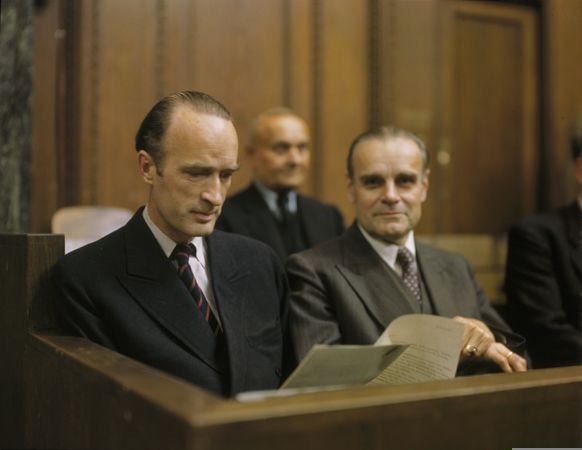Women at Nuremberg: Cecelia Goetz
Editor’s Note: USC Shoah Foundation is spotlighting the under-examined efforts of women at the Nuremberg Trials in an eight-part series of stories that each focuses on the contribution of a different woman. The stories were shared in a Jan. 30 public lecture titled “Women at Nuremberg” by Diane Marie Amann (University of Georgia), who came to work at the USC Shoah Foundation Center for Advanced Genocide Research as a fellow in January.

The German industrialists who reaped enormous profits by supplying armaments to the Nazi regime and putting slave laborers to work making guns and other munitions in concentration camps during the Holocaust eventually had to face a reckoning at the Nuremberg Trials.
In one of the most famous cases, which put the leadership team of the family-owned steelmaker Krupp AG on trial, the defendants heard the prosecution’s opening statement from an attorney who was making history while standing before them.
Her name was Cecelia Goetz, and she was the only woman ever to deliver an opening statement at Nuremberg.
“Krupp needed no urging to participate in the war crimes and crimes against humanity committed under the Third Reich in the course of the war,” the 30-year-old Goetz told the judges on Dec. 8, 1947. “It aggressively sought the right to exploit the material and human resources of the conquered countries in the interest of the Nazi war machine.”
Seven years before, Goetz – who passed away in 2004 at age 86 – had been the whiz of her graduating class at New York University. She’d been editor-in-chief of the Law Review – the first female editor of a major law review in the United States – spent a year at the Sorbonne in Paris and held an officer’s position in the American Law Students Association.
And yet, after graduation, Goetz found that few jobs were open to women.
“Goetz, it was suggested, was ‘much too attractive to be a good lawyer,’” wrote University of Georgia researcher Diane Marie Amann in a research paper; Amann came to work at the USC Shoah Foundation Center for Advanced Genocide Research as a fellow in January.
Positions started to open up after men went off to war, Amman wrote. Goetz came to Washington, D.C., where her skills were rapidly noted and she was hired to the Solicitors’ Office of the Justice Department. After declining a supervising role at the department, she fought to join the prosecution for the Nuremberg Trials, wanting to bring perpetrators to justice after learning of the human rights abuses they had carried out.

In order to work alongside the men, she had to sign a disablity waiver.
The Krupp case wasn’t the only industrialist trial Goetz worked on as an associate counsel in the prosecution at Nuremberg. In a preceding case, also in 1947, she was assigned to gather evidence against industrialist Freidrich Flick for slave labor, violations of the rules of war and spoliation (the acquisition of assets in the occupied territories). Flick was convicted and sentenced to seven years in prison.
Goetz attracted international media attention for her opening statement in the Krupp case.
“I didn’t realize what I freak, in a sense, I was until some English reporters arranged to take a picture of me and to interview me and it became a front page story in the New York papers, shown on TV throughout Germany,” Goetz said. “It was all because I was a young woman attorney at Nuremberg. I was much more an anomaly than I thought I was.”
But although prosecutors were able to convict defendants of waging aggressive war in several major cases at the Nuremberg Trials and in spite of Goetz’s lauded brief, the indictment against Krupp was dismissed. Goetz found this frustrating, but she didn’t give up.
“When they dismissed the aggressive war count, I began working on the slave labor count,” Goetz said in her testimony. “From a legal point of view, it was much easier because the evidence was so overwhelming. Krupp had used so much slave labor. There wasn’t one area of slave labor available to the Germans – prisoners of war, residents of the occupied countries, concentration camp labor – there wasn’t one area that Krupp hadn’t exploited to the utmost, with great enthusiasm.”
For their role in the Holocaust, much of the leadership at Krupp went to prison, including Alfried Krupp, the CEO, who was sentenced to 12 years but was pardoned and released after serving three.
After Nuremberg, Goetz returned to New York to work as a partner in a firm she started with her father. She returned to D.C. in 1951, when top American officials in Germany ordered Krupp to be released and his property returned, and worked as assistant chief counsel to the Office of Price Stabilization – the first woman to reach that high a level in the agency.
Goetz would return to New York and earn a master-of-laws degree (LLM) in tax law in 1958. That same year, she married and later had two children, whom she raised while working at various New York law firms. In yet another pioneering moment, Goetz would become the first woman bankruptcy judge in the Eastern District of New York.